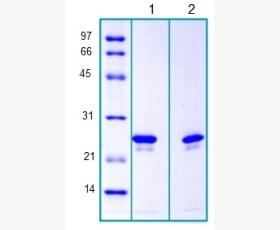Recombinant Human CD30/TNFRSF8/CD30L Receptor
| Product name: | Recombinant Human CD30/TNFRSF8/CD30L Receptor |
| Source: | Human Cells |
| Purity: | Greater than 95% as determined by reducing SDS-PAGE. |
| Buffer Formulation: | Lyophilized from a 0.2 μm filtered solution of 20mM PB, 150mMNaCl, pH7.4. |
| Applications: | Applications:SDS-PAGE; WB; ELISA; IP. |
| Storage: | Avoid repeated freeze/thaw cycles. Store at 2-8 oC for one month. Aliquot and store at -80 oC for 12 months. |
| UOM: | 100ug/50ug/200ug/1mg/1g |
| Source | Human Cells |
| Description | Recombinant Human TNFRSF8 is produced by our Mammalian expression system and the target gene encoding Phe19-Lys379 is expressed with a Fc tag at the C-terminus. |
| Names | Tumor necrosis factor receptor superfamily member 8, CD30L receptor, Ki-1 antigen, Lymphocyte activation antigen CD30, CD30, TNFRSF8 |
| Accession # | P28908 |
| Formulation | Lyophilized from a 0.2 μm filtered solution of 20mM PB, 150mMNaCl, pH7.4. |
| Shipping |
The product is shipped at ambient temperature. |
| Reconstitution |
Always centrifuge tubes before opening. Do not mix by vortex or pipetting. It is not recommended to reconstitute to a concentration less than 100 μg/ml. Dissolve the lyophilized protein in ddH2O. Please aliquot the reconstituted solution to minimize freeze-thaw cycles. |
| Storage |
Lyophilized protein should be stored at < -20°C, though stable at room temperature for 3 weeks. Reconstituted protein solution can be stored at 4-7°C for 2-7 days. Aliquots of reconstituted samples are stable at < -20°C for 3 months. |
| Purity |
Greater than 95% as determined by reducing SDS-PAGE. |
| Endotoxin | Less than 0.1 ng/µg (1 IEU/µg) as determined by LAL test. |
| Amino Acid Sequence |
FPQDRPFEDTCHGNPSHYYDKAVRRCCYRCPMGLFPTQQCPQRPTDCRKQCEPDYYLDEADRCTA CVTCSRDDLVEKTPCAWNSSRVCECRPGMFCSTSAVNSCARCFFHSVCPAGMIVKFPGTAQKNTV CEPASPGVSPACASPENCKEPSSGTIPQAKPTPVSPATSSASTMPVRGGTRLAQEAASKLTRAPD SPSSVGRPSSDPGLSPTQPCPEGSGDCRKQCEPDYYLDEAGRCTACVSCSRDDLVEKTPCAWNSS RTCECRPGMICATSATNSCARCVPYPICAAETVTKPQDMAEKDTTFEAPPLGTQPDCNPTPENGE APASTSPTQSLLVDSQASKTLPIPTSAPVALSSTGKIEGRDMDPKSCDKTHTCPPCPAPELLGGP SVFLFPPKPKDTLMISRTPEVTCVVVDVSHEDPEVKFNWYVDGVEVHNAKTKPREEQYNSTYRVV SVLTVLHQDWLNGKEYKCKVSNKALPAPIEKTISKAKGQPREPQVYTLPPSRDELTKNQVSLTCL VKGFYPSDIAVEWESNGQPENNYKTTPPVLDSDGSFFLYSKLTVDKSRWQQGNVFSCSVMHEALH NHYTQKSLSLSPGK
|
| Background | CD30, also known as TNFRSF8, is a cell membrane protein of the tumor necrosis factor receptor family, which regulates proliferation/apoptosis and antibody responses. CD30 is expressed by activated, but not by resting, T and B cells. Aberrant expression of CD30 by mastocytosis mast cells and interaction with its ligand CD30L (CD153) appears to play an important role in the pathogenesis and clinical presentation of systemic mastocytosis. CD30 has been considered as a specific diagnostic biomarker of anaplastic large cell lymphoma (ALCL) and classical Hodgkin lymphoma (cHL). CD30 is also a biomarker used for targeted therapy by an antibody–drug conjugate. |














